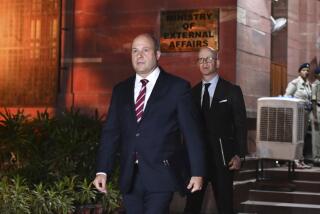U.S. to ‘Zap ‘Em Again’ but Sees No Halt in Arms Talks
- Share via
WASHINGTON — The United States is preparing further retaliation against the Soviet Union, Administration officials said Wednesday, in a superpower test of nerves that already has resulted in the expulsion of 90 diplomats on both sides.
“We will zap ‘em again, so batten down the hatches,” one official said, making it clear that President Reagan will maintain his hard-edged policy, despite the misgivings of the State Department and CIA that Washington will lose more than it can gain in the exchange of diplomatic ousters.
However, despite the severest Washington-Moscow tension since a Soviet fighter pilot shot down a South Korean airliner in 1983, U.S. officials said they expect arms control talks in Geneva to continue because it is not in the national interest of either country to break them off--at least not now.
“This action will cast a pall over relations, which will make things more difficult in any forum,” an official said. “But arms control is what captures public opinion, and the Soviets see that as their best chance to make propaganda points. If they walk out, they would look like the obstructionists.”
Another Administration official said: “The arms control community is not overly concerned about all of this. Reading the tea leaves, we conclude that they (the Soviets) want to see what we are going to put down at (the arms control talks in) Geneva. Until that is done, nothing is going to get in their way.”
So far, the casualties in the expulsion war have been heavily weighted against Moscow. In little more than a month, 80 Soviet diplomats--42 from the embassy in Washington, 13 from the consulate in San Francisco and 25 from the U.N. mission in New York--have been ordered to go home. In response, the Soviets have expelled 10 American diplomats.
Administration officials quoted by the Associated Press said the 80 Soviets included the entire leadership of the KGB and GRU intelligence agencies in the United States. The officials, who briefed reporters on the condition that they not be identified by name, said the orders marked “the end of an era” in Soviet espionage.
“The Soviets operated the largest spy network in the world in the United States, but no longer will they have a massive, unchallenged, bloated number of intelligence officers here as some kind of inherent right or special privilege,” an official said.
Latest Soviet Action
In the latest action, the Soviet Union on Wednesday ousted five Americans, four from the embassy in Moscow and one from the consulate in Leningrad. At the same time, Moscow announced that with a few exceptions, Soviet citizens will no longer be allowed to work for the U.S. diplomatic missions.
A total of 260 Soviets were employed as drivers, janitors, cooks or other service workers. The Soviet government said American citizens sent to replace the Soviet service personnel would have to be counted against the ceiling on U.S. representation--which means, in effect, that for every American driver or cook sent to Moscow, the United States will have to bring home a diplomat.
But an Administration official said Washington was “slightly relieved” that the latest Soviet action was not more severe.
‘We Can Get By’
“If they had wanted to carry the tit-for-tat matter to its logical conclusion, they could have thrown out 50 or 55 diplomats,” the official said. “The loss of the Russian workers will cause some delays in services and some dislocation, but we can get by. We can use motor pools, double up and tighten up.”
The latest Soviet action was announced shortly before Soviet leader Mikhail S. Gorbachev attacked the United States in a speech carried on Soviet television. Gorbachev described the U.S. expulsion orders as “outrageous” and said the Soviets had no choice but to retaliate.
In a surprisingly conciliatory response to the Gorbachev speech, White House spokesman Larry Speakes said late Wednesday: “We believe an historic breakthrough occurred in Reykjavik (at the superpower summit meeting in Iceland earlier this month), and there is no turning back. . . . We are pleased that General Secretary Gorbachev also stated the Soviet desire to move forward from where the two sides left off at Reykjavik. Much hard work remains, but we are ready to get on with it.”
Speakes did not mention the latest Soviet expulsion in his written statement.
Public Relations Blitz
Ever since State Department spokesman Charles Redman announced the expulsion of 55 Soviet diplomats Tuesday, State Department officials have been in the forefront of an Administration public relations blitz in support of the action. For instance, Under Secretary of State Michael H. Armacost, interviewed Wednesday by CBS, described the U.S. expulsion as “reasonable” and asserted, “We’ve got to compete where we’re challenged.”
Nevertheless, State Department officials said privately that the department argued against the wholesale expulsion before Reagan decided to go ahead with it. A former CIA official said the agency also has traditionally opposed mass expulsions of diplomats, even those 2003332896agents.
A State Department maxim holds that “a spy identified is a spy neutralized.” By that theory, the department would rather let Moscow keep known spies in the United States than allow it to replace them with new ones whose characteristics and methods of operating are unknown. From the CIA’s perspective, both nations use diplomatic cover for intelligence-gathering, and the CIA wants the U.S. Embassy staff in Moscow to be kept as large as possible.
Meese the Main Force
One State Department official said Atty. Gen. Edwin Meese III was the main force behind the expulsions of the 55 Soviets. An FBI official agreed that the Justice Department and the FBI were consistent in their view that a reduction in the Soviet Embassy staff would “give us less (spies) to watch.”
“Meese was a very big player,” the State Department official said. “It is part of his agenda. He is the chief cop, and he says he wants them out.”
The debate over the size of Soviet diplomatic missions has been going on for years, and the arguments in favor of Tuesday’s expulsions were little changed from the arguments the Justice Department and FBI used earlier in unsuccessful attempts to persuade the White House to force a reduction in the Soviet diplomatic representation.
Why did the Administration decide to move now? Redman said the most important reason was that Washington had warned the Soviets against retaliating for the expulsion of the Soviet diplomats from the United Nations, saying that Washington would order a reduction in the Soviet Embassy and Consulate staffs to bring them down to the number of Americans stationed in Moscow and Leningrad. The Soviets ignored the warning and ordered a retaliatory expulsion Sunday.
At that point, Redman said, the United States was committed to following through on its threat.
More to Read
Get the L.A. Times Politics newsletter
Deeply reported insights into legislation, politics and policy from Sacramento, Washington and beyond. In your inbox three times per week.
You may occasionally receive promotional content from the Los Angeles Times.










